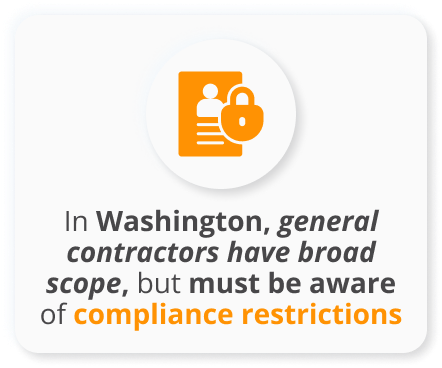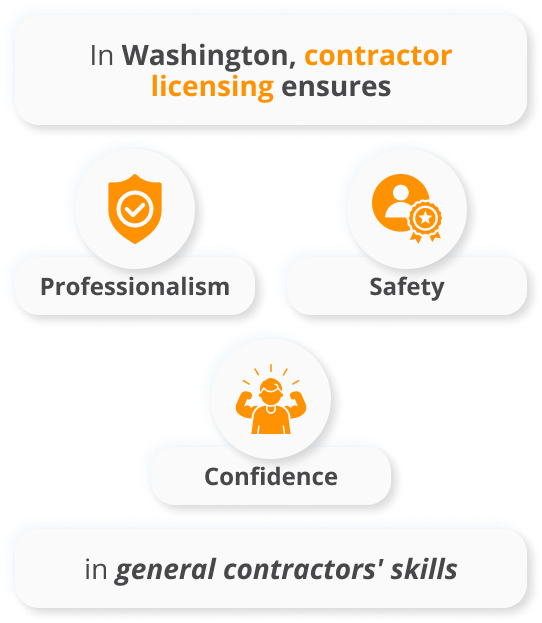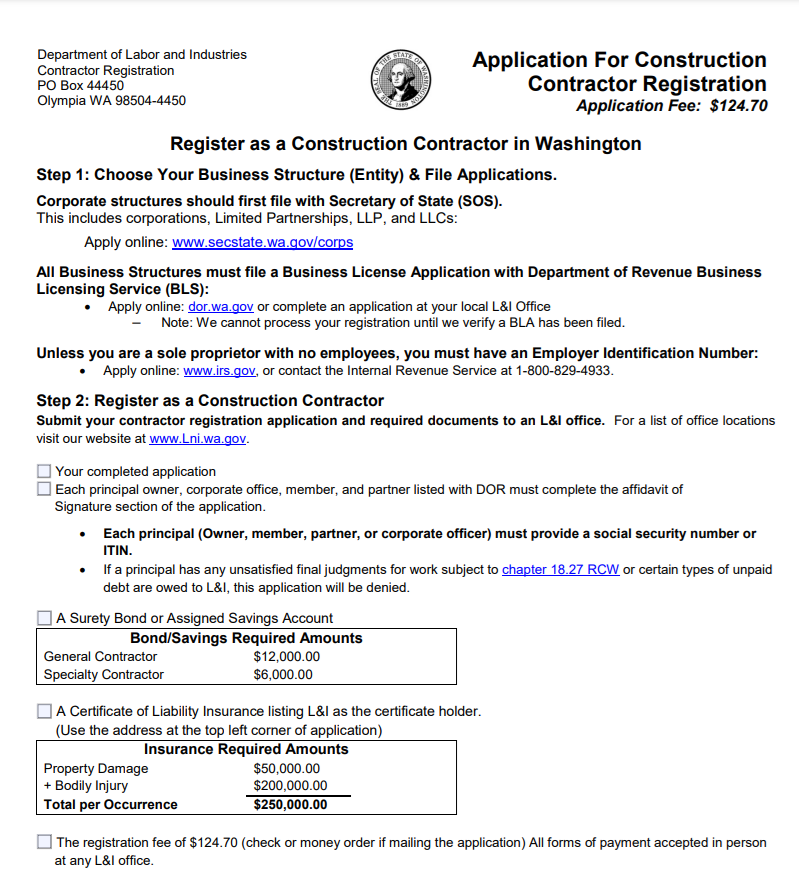Mastering Contractor Licensing in Washington: Your Guide to Navigating the Construction Landscape with Confidence! Get Your General Contractor License in Washington.
For contractor license information in Washington, you can contact the Washington State Department of Labor & Industries (L&I).
Contact Information:
Web: Washington State Department of Labor & Industries
Alternate Phone Number: 512-463-6599 (For calls outside Texas)
Alternate Phone Number: 512-463-6599 (For calls outside Texas)
Phone: 1-800-647-0982
Alternate Phone Number: 512-463-6599 (For calls outside Texas)
Alternate Phone Number: 512-463-6599 (For calls outside Texas)
Address: Washington State Department of Labor & Industries
7273 Linderson Way SW,
Tumwater, WA 98501
For more information, visit: Washington State Department of Labor & Industries
Introduction to General Contractor License in Washington.
In the ever-evolving landscape of the construction industry, the state of Washington upholds a stringent yet essential framework for contractor licensing, primarily administered by the Washington State Department of Labor & Industries. This regulatory body plays a pivotal role in ensuring that contractors operating within the state adhere to the highest standards of professionalism, safety, and ethical conduct. Get Your Contractor License In Washington.<
For general contractors, obtaining a license is a testament to their capability to handle a diverse range of construction tasks. It signifies their proficiency in managing projects, adhering to building codes, and ensuring workplace safety. Moreover, it instills confidence among clients and stakeholders, affirming that the contractor is equipped with the necessary skills, knowledge, and ethical standards to execute construction projects efficiently and responsibly. Get Your Contractor License In Washington.
General Contractor License: Scope and Limitations in Washington
In Washington, the scope of work that a general contractor can undertake is extensive, reflecting the diverse nature of the construction industry. However, understanding the limitations and special considerations associated with certain types of work is crucial for contractors to operate within the legal framework set by the state.

Scope of Work for General Contractors:
- Broad Range of Construction Activities: General contractors in Washington are equipped to handle a wide array of construction projects. This includes, but is not limited to, building new structures, renovations, additions, and demolitions.
- Subcontractor Management: One of the key roles of a general contractor is the ability to hire and manage subcontractors. This capability allows them to oversee projects that involve multiple specialties, ensuring that each aspect of the project is executed by skilled professionals.
- Project Oversight: General contractors are responsible for the overall coordination of a construction project. This includes managing timelines, budgets, materials, and labor to ensure that the project is completed efficiently and to the satisfaction of the client.
Special Considerations for Specific Trades:
- Plumbing and Electrical Work: Contractors who wish to engage in plumbing or electrical work must meet additional educational and licensing requirements. These trades require specialized knowledge and skills due to their complexity and the potential risks involved.
- Elevator Installation and Maintenance: This specialty area requires contractors to have specific technical knowledge and adhere to stringent safety standards.
- Mobile Home Installation: Contractors working in this niche must understand the unique aspects of mobile home construction and installation, which differ significantly from traditional home building.
- Boiler Work: Given the potential hazards associated with boilers, contractors must possess specialized knowledge and comply with specific safety regulations.
- Asbestos Removal: This is a highly specialized and sensitive area of work, requiring contractors to have thorough training in safe asbestos handling and removal practices, as well as compliance with environmental regulations.
Registration Process with the Department of Labor & Industries in Washington
Registering as a contractor in Washington involves a series of steps, each crucial for legal compliance and successful operation in the construction industry. The Washington State Department of Labor & Industries (L&I) oversees this process, ensuring that contractors meet the necessary requirements. Here’s a step-by-step guide to help you navigate the registration process:

- Understanding the Requirements:
- Before beginning the registration process, it’s important to understand the specific requirements set by the L&I. This includes eligibility criteria, necessary documentation, and any special conditions based on the type of construction work you plan to undertake.
- Gathering Necessary Documentation:
- Prepare all required documents, which typically include proof of identity, business details, and any relevant certifications or qualifications.
- Ensure you have details of your business structure (such as sole proprietorship, partnership, LLC, etc.) and your Unified Business Identifier (UBI) number, if applicable.
- Securing a Surety Bond and Insurance:
- Obtain a surety bond of $12,000. This acts as a financial guarantee to protect your clients.
- Acquire general liability insurance with minimum coverage of $50,000 for property damage and $200,000 for public liability, or a combined single limit policy of $250,000.
- Completing the Contractor Registration Application:
- Fill out the Contractor Registration Application form, which can be found on the L&I website or at any L&I office.
- Ensure all information is accurate and complete to avoid delays in processing. Get Your Contractor License In Washington.
- Paying the Registration Fee:
- A registration fee is required to process your application. Check the latest fee structure on the L&I website, as fees may change.
- Submitting the Application:
- Submit your completed application along with the required documents and fee to the L&I. This can typically be done online, by mail, or in person at an L&I office.
- Awaiting Approval:
- After submission, your application will be reviewed by the L&I. This process may take several weeks. During this time, your application status can usually be tracked online.
- Receiving Your Registration:
- Once your application is approved, you will receive your contractor registration. This registration is crucial for legally operating as a contractor in Washington.
- Staying Compliant:
- Keep track of when your registration expires and ensure you renew it on time. Also, stay informed about any changes in regulations or requirements that might affect your registration status.
Financial and Insurance Requirements for Washington Contractors

Surety Bond Requirement:
- All contractors in Washington must secure a $12,000 surety bond. This bond acts as a financial guarantee that the contractor will adhere to the contractual and legal obligations.
- The bond protects clients against damages due to improper or incomplete work and ensures that subcontractors and suppliers are paid.
- To obtain this bond, contractors typically work with an insurance or surety company. The cost of the bond depends on various factors, including the contractor’s credit history and business financials.

General Liability Insurance:
- Contractors are required to have general liability insurance. This insurance covers potential claims of property damage or bodily injury caused by the contractor’s operations.
- The minimum coverage amounts are $50,000 for property damage and $200,000 for public liability. Alternatively, contractors can opt for a combined single limit policy of $250,000.
- This insurance is crucial for protecting the contractor and their clients in case of accidents or damages during the construction process.
See the Official Document:


Submitting Proof of Insurance and Bond:
- Proof of the surety bond and insurance must be submitted to the Washington State Department of Labor & Industries as part of the registration process.
- Ensure that these documents are kept up-to-date and renew them as necessary to maintain continuous coverage.

Additional Insurance Considerations:
- Depending on the nature of their work, contractors may also consider additional insurance types, such as workers’ compensation (if they have employees), professional liability, or vehicle and equipment insurance.
- Regularly reviewing and updating insurance coverage is important as the business grows or takes on different types of projects.
The examination requirements for contractors in Washington vary depending on the contractor license you seek. However, some general requirements apply to all contractors:
- You must be at least 18 years old.
- You must have a valid UBI number.
- You must purchase a Washington Continuous Contractor Surety Bond in the amount of:
- $12,000 for general contractors.
- $6,000 for specialty contractors.
- You must obtain a general liability insurance policy in the amount of:
- $200,000 in public liability and $50,000 property damage, or $1 million combined single limit.
Examination Requirements for General Contractor License in Washington.
In addition to the general requirements, you must also pass an examination to obtain a contractor license in Washington. The specific examination requirements vary depending on the type of contractor license you are seeking. Get Your Contractor License In Washington. Get Your Contractor License In Washington.<

- General contractors: General contractors must pass two examinations:
- Business Management/Law exam
- Trade exam
- Electrical contractors: Electrical contractors must pass a three-part examination:
- Business Management/Law exam
- Electrical Trade exam
- Journeyman Electrical exam
- Plumbing contractors: Plumbing contractors must pass a three-part examination:
- Business Management/Law exam
- Plumbing Trade exam
- Journeyman Plumbing exam
You can find more information about the examination requirements for specific contractor licenses on the website of the Washington Department of Labor and Industries (L&I). Get Your Contractor License In Washington.<
Frequently Asked Questions (FAQ)
These are common questions about General Contractor License in Washington.
The Department oversees the registration, regulation, and enforcement of contractor licensing in Washington, ensuring compliance with state laws and industry standards.
General contractors can undertake a wide range of construction work but must adhere to specific regulations for specialty areas like plumbing, electrical, and asbestos.
Yes, contractors working in fields like plumbing, electrical, and asbestos need to meet extra education, examination, and licensing requirements.
Contractors must provide proof of a $12,000 surety bond and general liability insurance with minimum coverage amounts specified by the state.
Yes, a mandatory exam covering business practices, construction law, and other relevant topics is required for general contractors.



